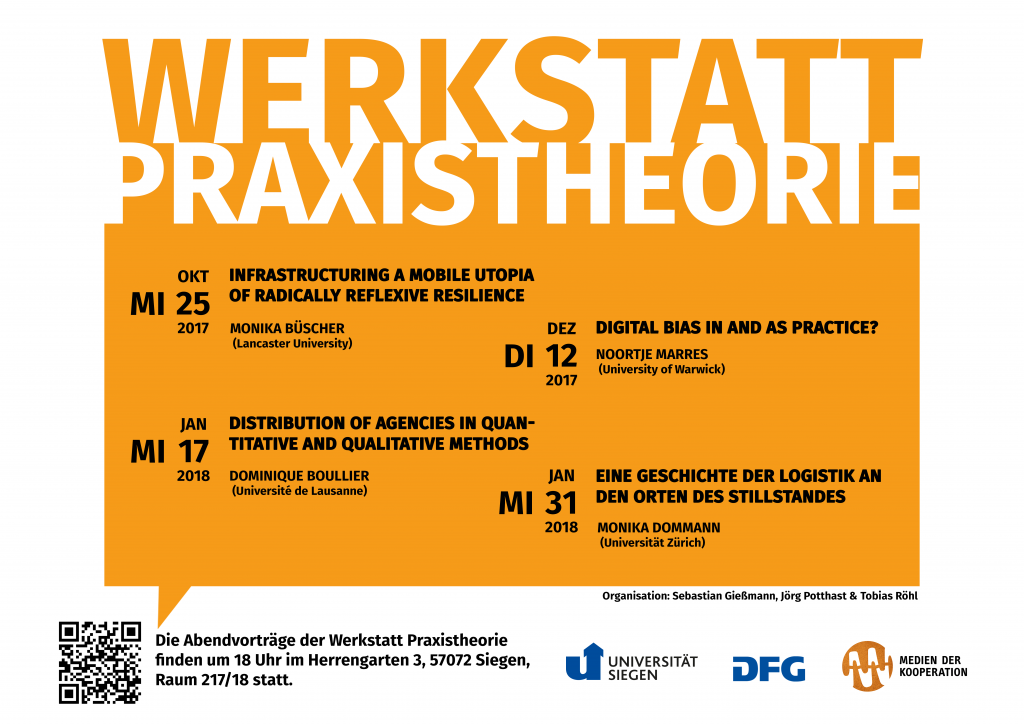Werkstatt Praxistheorie Winter 2017/18
Die Werkstatt Praxistheorie widmet sich in diesem Semester den Medienpraktiken der Delegation.
Das übergreifende Ziel der Werkstatt Praxistheorie A ist eine Neuperspektivierung der Mediengeschichte und Medienanalyse, die Praxis allen anderen Größen vorlagert und deshalb vor allem Produktions- und Arbeitsprozesse in den Vordergrund rückt. Für die historiographische und ethnographische Arbeit sollen die ‚Medien der Kooperation‘ in drei praxis- und medientheoretischen Kategorien heuristisch erfasst werden: Medienpraktiken der Koordination, Medienpraktiken der Delegation und Medienpraktiken der Registrierung und Identifizierung. Anhand dieser Kategorien werden Medienpraktiken in Öffentlichkeiten und Infrastrukturen untersucht.
Praxistheorie B wird sich der ‚Theoretischen Empirie‘ widmen und Forschungen versammeln, die es verstehen, Fragen der Theorieentwicklung und eigenständige empirische Forschung präzise aufeinander abzustimmen. Zu diesem Zweck lassen sich drei ‚Mittelpunkte‘ benennen, welche sich seit dem ‚Practice turn‘ herauskristallisiert haben: (1) Medienpraktiken des Entstörens und Reparierens (2) Medienpraktiken des Experimentierens und (3) Medienpraktiken des Aktualisierens.

Vorträge im Wintersemester 2017/18
Jeweils mittwochs um 18 Uhr
Mit Ausnahme des Termins am 12.12.2017 an einem Dienstag
Campus Herrengarten, Raum AH-217/18
Since the 1992 Earth Summit, more than 4.4 billion people or 64% of the world’s population have been affected by disasters, and the number of ‘loss events’ has more than doubled (UNISDR 2012, Munich RE 2017). Resilience concepts respond to these pressures. However, the meanings, policies, and practices of resilience are ambiguous, enacting neoliberal devolution of risks and individualisation of responsibility, as well as new forms of relational resilience with ambitions for ‘respectful reciprocity, self-governance, improvisation and mutual aid’ (Crawford et al 2013:6). Digital technologies and novel platforms for ‘crisis mapping’ are a perspicuous site for an investigation of how such ideas of resilience are pursued, contested, and practically accomplished across sometimes globally distributed networks of actors. A particularly interesting aspect of this work are practices of ‘infrastructuring’ ‘mobile utopia’ of radically reflexive resilience. In this paper, I explore how almost all variations of resilience have a utopian dimension in that they envisage a way to ‘build back better’ or respond to risks preventatively, and how they require the mobilisation of ideas, people, and resources. I ‘mobilise’ utopia as a method for speculative sociology, following Levitas (2013) to critically unearth dynamics of mediating disasters and responses to them, to reflect on what it means to be resiliently human, and to describe the making of resilient socio-technical futures for, by and with diverse collectives. I explore what it might mean to ‘get relational’ and how forms of ‘reflexive doubt’ (Beck 1997, Cash 2016) and radical reflexivity (Pollner 1991) might support ‘good’ resilience.
Online data and software tools have been widely taken up to research social life, but their objectivity continues to be questioned in the social sciences and humanities: the data sets are incomplete, the tools don’t let us answer the important questions. Arguably, however, problems of ‚digital bias’ are changing face. Classic work on bias as a sociological phenomenon – Becker on lablleing; Hacking on interactive kinds – are becoming newly relevant, as digital platforms get caught up in interactive societal processes, whereby discriminatory content gets promoted online, and ’smart‘ services privilege some demographics over others. This paper will examine how sociological concerns with bias pertain to today’s digital societies, and ask: What is the contribution of praxiography to the elucidation of digital bias? In what ways do phenomena of digital bias pose a productive challenge for praxiology?
The history of quantification demonstrates how new calculation systems are associated to new conceptual frameworks in statistics and in the entities discovered (from society to opinion and now to replications). However, beyond these empirical observations of sciences in the making, a systematic choice of viewpoints is always made that emphasizes a specific kind of distribution of agencies: structures, individuals‘ preferences or replications as circulating entities. This is true for data science studies of Twitter for instance and for qualitative methods as well. This allows us to better understand why social sciences have always been the stage for fighting paradigms, including the more recent challenges brought in by ANT. The investigation of the social world requires to maintain a specific analytical point of view where the „whole“ of the assemblage gets lost for the benefit of the emergence of each agency.
Abstract coming soon.
Kontakt:
Dr. Sebastian Gießmann
sebastian.giessmann[æt]uni-siegen.de